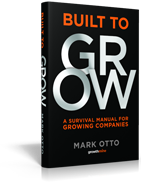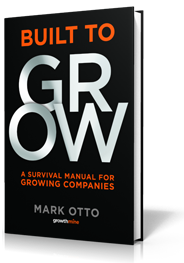
Why You Need an Executive Coach

When you’re clawing your way to the top, it’s easy to cling to the illusion that you’ll have everything figured out when you get there. But when you get there, you find out some things remain unknown or uncomfortable. As talented, experienced, and motivated as you are, you are only one person. It can seem like there’s nowhere else to turn. The top job can be overwhelming. The reality of today’s business world is that a CEO is only as good as the last quarter, or her last decision, or her ability to stay ahead of the competition. That’s a lot of pressure. People jump from the top floors in buildings, not the bottom floors.
So where do you turn for objective advice?
To stay ahead of the growth curve, leaders need a trusted advisor – a guide – who understands the challenges of running a growing organization. No one on the org chart has more to gain from intelligent counsel than the CEO, yet the majority of CEOs are not utilizing a coach.
A recent Stanford University/The Miles Group survey found that two-thirds of CEOs don’t receive outside coaching or leadership advice – but almost all want it. Knowing how important it is for a CEO to receive the best possible counsel – independent of the board or other influences – no one should be going it alone.
The Evolution of Coaching
Becoming a CEO doesn’t mean that you suddenly have all the answers. Smart executives realize that they must continue to grow and develop. In recent years, coaching has lost its stigma from the days where it was seen as the last step for an executive about to fall off the ladder. Today, top executive coaches are coveted for their ability to help leaders improve performance, much like how elite athletes use coaches to perform at the highest possible level.
Executive coaching isn’t about fixing problems; it’s about helping successful leaders become more successful. Coaches help smooth out executive transitions, assist with organizational dynamics, advise on developing the leadership team, and offer counsel on a variety of strategic and operational issues. Coaching makes CEOs more effective leaders.
The good new is a growing number of executives now see coaching as an important factor in their success. The bad news is that, as demand increases, so does the number of people claiming to be executive coaches.
Anyone can claim to be a coach.
So, how do you find the right coach, capable of taking your performance to the next level? Here are five things to keep in mind:
- Experience at your level: You need counsel from an objective third party who has walked in your shoes, and faced the same pressures and challenges. Someone with a history of accomplishments and accountability at C, E, and S levels – someone that is a true peer of yours. You should be working with a coach who is very smart, has tremendous business acumen, and a deep understanding of organizational and interpersonal dynamics. Don’t take advice or counsel from any coach that hasn’t been successful in the job themselves. Your career is not the place to experiment with academic theory. Choose wisely. Choose a business leader.
- Ability to tailor their methodology to your context: Top coaches will be able to clearly outline their methodology, but it’s critical that they are able to tailor their approach to your needs and goals. Find a coach who has real experience, a broad perspective, and a flexible approach. You need advice and objective feedback from someone who understands the context of your business and the issues you currently face. A strong coach should be able to describe specifically how he has worked with other executives – in very different situations – and improved their leadership, management, and other capabilities.
- Set clear goals: Clearly communicate to the coach what outcomes you are looking for, and what benefits you expect him or her to deliver. Make sure there is a plan in place to measure progress. It is your responsibility to make sure that the cost of coaching is worth the benefits it yields. The expected results must be clearly understood by both parties, and clearly spelled out before the engagement begins. A prospective coach should be able to explain how she will help you reach your goals and achieve the outcomes you expect. Make sure that you know how you will learn new skills and behaviors, and how the coach will support you in the application of those skills in your day-to-day life.
- Clarify the role: Beyond the role of coach or mentor, look for someone who can serve as your most trusted advisor. This means that at different times your coach may also play the role of sounding board, strategist, tactician, cheerleader, negotiator, lobbyist, crisis manager, diplomat, facilitator, influencer, and a variety of other roles. A coach’s only agenda is helping you become more successful. A top advisor will be fiercely committed to helping you achieve your goals and the results you desire. Don’t settle for anything less than the best advisor available.
- Step outside yourself: We all have blind spots. Find a coach who can credibly assess your strengths and weaknesses. You need help seeing the things you cannot see yourself and that others won’t tell you. This will mean getting feedback from those who work closest with you and acknowledging that feedback. You should be looking for someone to bring fresh perspectives to the table – someone that will tell you what you need to know, not what you want to hear.
Executive Coaching Produces Results:
- Faster achievement of organizational and personal goals.
- Heighten self-awareness of strengths and limitations.
- Increased strategic focus.
- Improved conflict management skills.
- Greater leadership sharing and delegation skills.
- Enhanced mentoring skills and stronger internal talent development.
- Stronger team building skills.
- Challenge, stretch, and develop critical thinking and leadership ability.
- Strengthened competencies such as decision making and problem solving.
Coaching is an Investment
Most CEOs make major investments in building their repertoire of skills and expertise early in their careers, only to make minimum investments in their professional development when they reach the top. But it’s at the top that an executive must be performing at the highest level. It’s at the top that the CEO should be making the biggest investment in his development. Executive coaching is one of the single best investments you can make in developing yourself into a more effective executive.
Whether you want to protect what you have worked so hard to achieve or you want to take your company and career to the next level, having an executive coach by your side can payoff big. There is a virtually endless list of reasons why you should have a coach. A great coach can help you see yourself more accurately; get clear about how to use your strengths; and support your transformation to meet the demands of bigger, more complex responsibilities. Make the choice carefully, and you’ll reap the benefits for years to come.
Do you have a trusted advisor that understands the leadership challenges you are facing?





